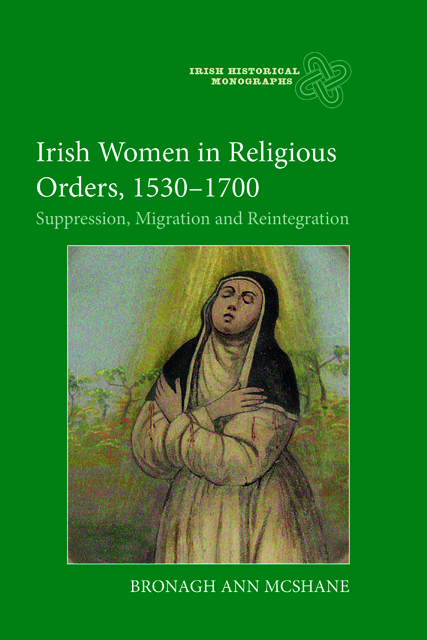3 - ‘What difficultie a place is heare gotten for won to enter’: Irish women religious in France and Flanders during the first half of the seventeenth century
Published online by Cambridge University Press: 17 December 2022
Summary
As scholars such as Brian Mac Cuarta, Mícheál Mac Craith and Thomas O’Connor have shown, from the late sixteenth century onwards, families of gentry and mercantile stock in north Leinster were directing their male offspring towards religious training and education in continental European colleges. That movement was encouraged and facilitated by members of religious orders, who, upon returning to Ireland, canvassed gentry families to send their young sons abroad to study for the priesthood at the major continental universities and recently established Irish colleges in locations such as Paris, Douai, and Louvain. Less well known is the fact that young women, too, were part of this wider recruitment drive. This chapter explores the numbers, modes of migration, and destinations of women who left Ireland in pursuit of formal religious vocations in continental European foundations and in English convents established in Europe. At a time when the onset of the Counter-Reformation witnessed a proliferation in the establishment of new religious institutions for women across Catholic Europe, it examines the importance of familial support networks in determining Irish women’s choice of destination and religious foundation. Placing the experiences of these Irish women within the wider context of Irish religious migration to Europe, it considers some of the challenges facing those who wished to pursue cloistered convent living abroad. Furthermore, it explores the importance of national identity among these Irish female religious migrants, and the extent to which their experiences of being Irish émigrés abroad strengthened their sense of their nationality. Although some Irish women travelled to convents abroad with the intention of becoming professed nuns, not all did so. For others, migration overseas was undertaken with the purpose of obtaining a ‘good’ Catholic education that would in turn enable them to pass the faith on to the next generation. The experiences of three elite young women of Old English backgrounds from County Meath, two Nugent sisters and their cousin, who spent time in France where they were educated by Sepulchrine canonesses during the late 1620s and early 1630s, will be used to shed light on the diverse nature of the educational programme they encountered.
- Type
- Chapter
- Information
- Irish Women in Religious Orders, 1530-1700Suppression, Migration and Reintegration, pp. 95 - 126Publisher: Boydell & BrewerPrint publication year: 2022

